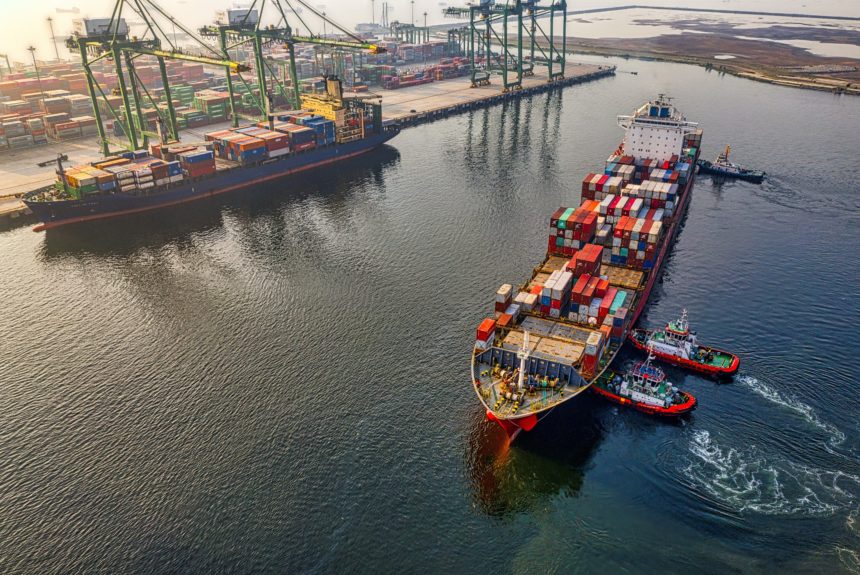Around the world, economic recovery from the pandemic is slower due to inefficient supply chains. Increased consumer demand for goods and services, as well as supply chain bottlenecks, largely explain the problem, but they have also been exacerbated by long standing government-imposed restrictions.
The Jones Act and the Foreign Dredge Act are two archaic laws that slow down economic development and help create bottlenecks in supply chains. The Jones Act, formally known as the Merchant Marine Act of 1920, mandates that any goods shipped by water between two points in the U.S. must be transported on a U.S.-built, U.S.-flagged, and at least 75% U.S.-crewed vessel. The Foreign Dredge Act is more than a century old, and prohibits any foreign-built or chartered ships from dredging in ship ports in the U.S.
As Congress and the current administration look to build back our nation’s infrastructure, they should repeal the antiquated and harmful Jones and Foreign Dredge Acts. Allowing cheaper, more efficient shipping would save taxpayers money, increase the economic competitiveness of America’s ports and help to reduce congestion on the roads.
Fact vs. Myth
- Fact: Shipping is less carbon-intensive than trucking or aviation.
- Myth: The United States has a robust shipping industry.
- Only around 2% of U.S. freight travels by sea versus 40% in Europe.
- Fact: In the last four years, 25 of our nation’s largest 110 shipyards have closed.
- Increased costs from the Jones and Foreign Dredge Acts contributed to this.
Problems with Jones and Foreign Dredge
The Jones Act and Foreign Dredge Act hurt our environment.
- The Jones Act has hurt offshore wind farm development and oil spill cleanup by not allowing foreign entities to transport necessary equipment between U.S. ports.
- Because there are so few, if any, U.S. ships that meet Jones Act requirements, dredging along our coastlines and in ports is harder to implement. This is detrimental to preventing coastal erosion (dredgers can place excess sediments to bolster coastal resilience and reduce erosion).
- High shipping costs as a result of both laws have pushed companies to use freight and trucking to transport goods, which are 3 to 4 times more carbon-intensive than shipping.
The Jones Act and Foreign Dredge Act hurt consumers and the economy.
- Ships that meet Jones Act criteria are 2.7 to 8 times more expensive than foreign ships.
- Extra congestion from high shipping prices costs Americans close to $260 billion annually after adjusting for inflation.
- In Puerto Rico, imports from mainland U.S. ports are 150% more expensive than imports from non-U.S. ports.
- The Jones Act adds approximately $300 to the annual food and beverage expenses of an average Puerto Rican family.
- The Jones Act also hurts consumers who are in need of critical commodities.
- Puerto Rico is unable to import liquified natural gas from the U.S. mainland because no ships exist that meet Jones Act requirements.
- Shipping oil from Texas to the Northeast United States is 3 times more expensive than importing oil from Africa.
- Despite the fact that the U.S. is the largest producer of rock salt, states such as Virginia and Maryland import the commodity from Chile because of Jones Act-imposed costs and restrictions.
The Jones Act and Foreign Dredge Act hurt our nation’s aging hard infrastructure
- Artificially inflated shipping costs force companies to use rail or trucks to move goods. This has a damaging effect on roads and bridges.
- Trucks are responsible for 75% of total road maintenance costs.
- Some estimates suggest that a typical 18-wheeler has the same impact on our roads as 9,600 passenger vehicles.
Markets vs. Mandates
- Shipping is the backbone of global trade with 80% of all goods being carried by sea.
- Despite the fact that “38 states and the District of Columbia are connected by navigable waterways and marine highways… coastal shipping of cargo between U.S. ports in the Lower 48 states comprises a negligible 2 percent of domestic freight.”
- Supply influxes and regulatory hurdles have created bottlenecks at U.S. ports.
- Reducing restrictions imposed by the Foreign Dredge Act would allow ships to transport more than a million dollars more worth of goods per trip, leading to fewer ships backlogged in ports.
How to ease supply chains through a “no regrets” policy framework
- The ultimate solution would be to eliminate the Jones and Foreign Dredge Acts entirely as they have failed to protect our shipping industry and are harming our economy, environment, and infrastructure.
- Short of ultimate repeal, Congress should:
- Eliminate the “Built in the USA” requirement of the Jones Act to allow American crews to staff foreign-made vessels.
- This would reduce costs to consumers and reduce the comparative advantage other nations have in ship building and dredging over the United States.
- Repeal Jones Act requirements for Puerto Rico, Hawaii, Alaska, and Guam.
- Allow friendly, allied nations to dredge U.S. ports.
- Industry analysts estimate that this would save taxpayers $1 billion per year.
- Require a regular report on the economic and environmental impacts of the Jones and Foreign Dredge Acts.
- Eliminate the “Built in the USA” requirement of the Jones Act to allow American crews to staff foreign-made vessels.
Summary:
- The Jones Act and Foreign Dredge Act impose serious costs to our economy, environment, and infrastructure.
- Both of these laws are archaic and slow down supply chains.
- Congress should repeal both acts to allow for free flowing ocean transportation and trade.
Done in partnership with the American Conservation Coalition (ACC)


